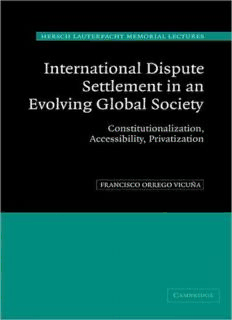Table Of ContentInternational Dispute Settlement in
an Evolving Global Society
Constitutionalization, Accessibility, Privatization
ThisbookistheoutcomeoftheSirHerschLauterpachtMemorialLecturesdeliv-
eredbytheauthoratCambridgeUniversityin2001.Itaddressesthreesalientissues
ofcontemporaryinternationaldisputesettlement:thedevelopmentofinternational
constitutionallawinaglobalsociety;theincreasingaccessoftheindividual;and
thedevelopingroleofinternationalprivatearbitration.
Thebookdiscussesrecentthoughtsandproposalsconcerninganewroleforthe
InternationalCourtofJusticeinperformingjudicialconstitutionalfunctions,with
particularreferencetotheUnitedNationsandthetrendstowardtherecognition
ofjudicialreview.Italsoaddressesthequestionoftheeventualestablishmentofan
InternationalConstitutionalCourt.
Theincreasingaccessofindividualstointernationaldisputesettlementisexam-
ined in the light of ICSID arbitration, free trade agreements and other devel-
opments in the WTO. Emerging trends in the organization of international
commercialarbitrationarediscussedinthelightofprivatizationarrangements.
francisco orrego vicun˜a isProfessorofInternationalLawattheInstitute
ofInternationalStudiesandLawSchool,UniversityofChile.Heiscurrentlythe
PresidentoftheWorldBankAdministrativeTribunalandamemberoftheICSID
PanelsofConciliatorsandArbitratorsbyappointmentofthePresidentoftheWorld
Bank.HehaslecturedinuniversitiesintheUSA,Europe,thePacificandSouth
America,andattheHagueAcademyofInternationalLaw.
Availabletitlesintheseries
francisco orrego vicun˜a
InternationalDisputeSettlementin
anEvolvingGlobalSociety
Constitutionalization,Accessibility,Privatization
0521842395
martti koskenniemi
TheGentleCivilizerofNations
TheRiseandFallofInternationalLaw1870–1960
0521623111hardback
0521548098paperback
thomas m. franck
RecoursetoForce
StateActionAgainstThreatsandArmedAttacks
0521820138
antonio cassese
Self-DeterminationofPeoples
ALegalAppraisal
052163752X
mohamed shahabuddeen
PrecedentintheWorldCourt
0521563100
elihu lauterpacht
AspectsoftheAdministrationofInternationalJustice
0521463122
arthur watts
InternationalLawandtheAntarcticTreatySystem
0521463114
ignaz seidl-hohenveldern
CorporationsinandunderInternationalLaw
0521463246
International Dispute
Settlement in an Evolving
Global Society
Constitutionalization, Accessibility, Privatization
˜
FRANCISCO ORREGO VICUNA
HerschLauterpachtMemorialLectures
2001
LauterpachtResearchCentreforInternationalLaw
UniversityofCambridge
CAMBRIDGE UNIVERSITY PRESS
Cambridge, New York, Melbourne, Madrid, Cape Town, Singapore, São Paulo, Delhi
Cambridge University Press
The Edinburgh Building, Cambridge CB2 8RU, UK
Published in the United States of America by Cambridge University Press, New York
www.cambridge.org
Information on this title: www.cambridge.org/9780521842396
© Francisco Orrego Vicuña 2004
This publication is in copyright. Subject to statutory exception
and to the provisions of relevant collective licensing agreements,
no reproduction of any part may take place without the written
permission of Cambridge University Press.
First published 2004
Reprinted 2006
A catalogue record for this publication is available from the British Library
ISBN 978-0-521-84239-6 hardback
Transferred to digital printing 2009
Cambridge University Press has no responsibility for the persistence or
accuracy of URLs for external or third-party Internet websites referred to in
this publication, and does not guarantee that any content on such websites is,
or will remain, accurate or appropriate. Information regarding prices, travel
timetables and other factual information given in this work are correct at
the time of first printing but Cambridge University Press does not guarantee
the accuracy of such information thereafter.
Contents
Preface pagevii
Acknowledgements ix
Listofabbreviations x
Tableoftreaties xii
Tableofcases xxi
1 Anevolvinginternationalsociety:institutionalization,
privatization,globalization 1
2 Aconstitutionalcourtforaninternationalsociety? 10
3 Individualsandsettlementofinternationalclaims:change
andadaptationofgoverningrules 29
4 Individualsbeforeinternationalcourtsandtribunals:
acontinuingprogression 48
5 Shapinganewrolefortheindividualininternationaldispute
settlement:thecontributionofspecializedjurisdictions 63
6 TheWorldTradeOrganizationintegrateddisputesettlement
system:innovationandtransition 85
7 Analternativedisputeresolutionsystemforinternational
disputes 98
8 Acentralized-decentralizeddisputeresolutionsystemforthe
internationalcommunity? 124
Bibliography 127
Index 142
v
Preface
IhavebeengreatlyhonoredbytheinvitationofSirElihuLauterpachtand
the Lauterpacht Research Centre for International Law at the University
of Cambridge to deliver the Sir Hersch Lauterpacht Memorial Lectures
for 2001. Because these are the first Lauterpacht Memorial Lectures at
thebeginningofanewcentury,itisappropriatetofocusonasubjectthat
is likely to endure for many years and to which Sir Hersch Lauterpacht
greatlycontributedinhisowntime.
Thenewarrangementsfordisputesettlementunderinternationallawin
an evolving international society pose a number of key questions. First, it
mustbeaskedwhatarethelikelycharacteristicsofinternationalsocietyin
theforeseeablefutureandwhatwillbetheirimpactupontheinternational
legalorder.Theevolutionthattookplaceinthisrespectduringthetwentieth
century offers a number of discernible trends that might serve to identify
thebasicfeaturesoftheinternationalsocietyandofinternationallaw.
The second major question arises from the fact that international rela-
tionsinanevolvingsociety,onethatisstilldevelopingitsgoverningstructure
andrules,necessarilyresultinawholesetofnewissuesassociatedwiththe
differenttypesofdisputesthatneedtobeattendedtointhechanginglegal
environment.Thisinturnraisesthequestionofthemostadequatedispute
settlement arrangements for handling the new legal, moral and political
concernsoftheinternationalcommunity.
Threecentralconcernsoftheinternationalcommunitywillbeexplored
in these lectures. First, the question of the need to establish and identify
basicconstitutionalrulesforthegovernanceofinternationalsocietywillbe
discussed.Inthiscontextonemightconsiderthefeasibilityofestablishing
anInternationalConstitutionalCourt,aswellastheroletheInternational
CourtofJusticehashadandislikelytohaveindealingwithconstitutional
vii
Preface
issues.Whilethisraisesimportantlytheproblemofthestructureandpow-
ers of the United Nations, it is not restricted to the ambit of any one
organization;italsocoversmanyquestionsofgeneralinternationallaw.
Theemergenceoftheindividualasasubjectandactorofinternational
law is a second major concern to be explored. This aspect relates both to
themodelsthatarealreadyavailabletosettledisputesinvolvingbothstate
andindividualinterestsandtotheneedsanddevelopmentsthatmightbe
envisaged in this field. However, although considerable progress has been
andisbeingmade,someimportantlimitshavebecomeevident;attending
to these with care is necessary if we are to avoid a distortion of the true
functionofthesenewarrangements.
As international society becomes both more complex and interrelated
thenumberofdisputeslikelytobesubmittedtointernationalproceduresis
expectedtogrowexponentially;thisisalreadyevidentfromcurrentprac-
tice.Thefeasibilityofestablishingastructuredorsemi-structuredmecha-
nismofalternativedisputeresolutionattheinternationallevelwillalsobe
explored, particularly with a view to attend the many disputes that relate
totransnationalbusinessandcommercialactivities.
The author had the opportunity and the privilege to participate as a
co-rapporteuronthesubjectofdisputesettlementfortheCentennialCom-
memorationoftheFirstPeaceConference.Thiseventtookplacein1999in
TheHagueandSt.Petersburg,attheinvitationoftheDutchandRussian
governments, just as it had done a century earlier. During the work lead-
ingtothiscommemorationandthediscussionsheldonthesubject,many
ideas were contributed by distinguished international lawyers and judges,
ofwhichmanyhavecontributedtothepresentshapeoftheselectures.
Itishopedthatthisdiscussionwillprovokenewthoughtsandeventually
lead to new proposals on the improvement of current dispute settlement
arrangements under international law, so as to facilitate the task of both
present and future international courts and tribunals, and other institu-
tions.Thisinitselfwould,ofcourse,bethegreatesthomagetoSirHersch
Lauterpacht,whosevisionofaninternationalsocietyunderlawhadatits
hearttheneedforjustandeffectiveinternationaljudicialinstitutions.
viii
Acknowledgements
The author wishes to acknowledge the many useful suggestions made by
colleagues and friends in the preparation and revision of these lectures.
Particular mention must be made of Sir Elihu Lauterpacht, Professor
James Crawford, Dr. Joanna Gomula and Mr. Darren Peacock, all from
the Lauterpacht Research Centre for International Law at the University
of Cambridge. Paz Zarate, from the Institute of International Studies of
theUniversityofChile,alsogreatlyhelpedintheorganizationofthetables
andbibliography.
Theresearchcarriedoutinthepreparationoftheselectureswasmade
possible under Grant No. 1000755 of the Chilean National Fund for
Scientific and Technological Development on “New Alternatives for the
SettlementofDisputesunderInternationalLaw:trendsforthetwenty-first
century”(2000–2002).
ix
Description:This book is the outcome of the Sir Hersch Lauterpacht Memorial Lectures delivered by the author at Cambridge University in 2001. It addresses three salient issues of contemporary international dispute settlement: the development of international constitutional law in a global society; the increasin

